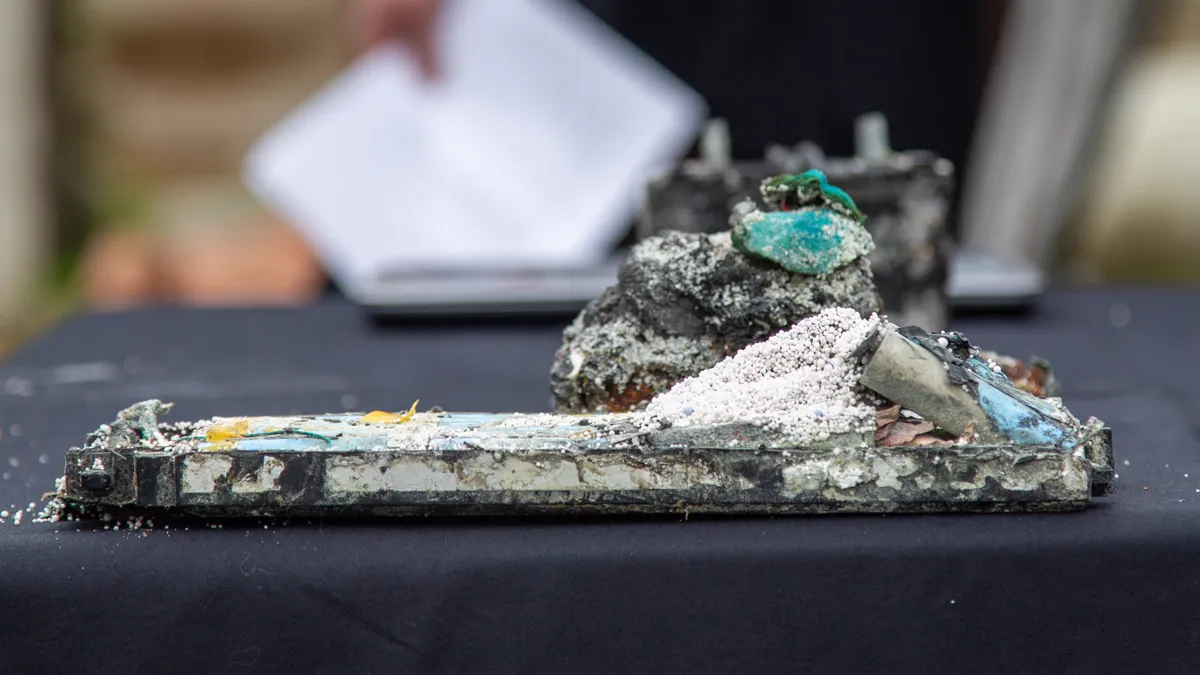Dive Brief:
- Seattle Public Utilities has enacted a ban on disposing batteries and electronics in municipal solid waste, citing increased fires at city-operated transfer stations.
- The disposal ban, which went into effect on Jan. 1, covers a variety of batteries and electronics, such as toys with embedded batteries, as well as computers, monitors and e-bikes.
- The disposal ban comes after the state adopted a battery EPR law in May last year. That law, meant to reduce fire danger in waste facilities, will require battery producers to fund and participate in an extended producer responsibility program.
Dive Insight:
Many of the provisions of Washington’s EPR for batteries program are set to begin in July 2027, including provisions directing residents to safely and properly dispose of batteries. Seattle officials decided a citywide disposal ban was needed sooner.
“Implementing a ban at the local level helps address the safety of our own staff and facilities,” said McKenna Morrigan, a strategic advisor for waste prevention and product stewardship with SPU.
Batteries are now the leading cause of fires at Seattle’s city-operated transfer stations. Other safety concerns include acid and metal leaks, according to the city.
Items included in the ban include lithium-ion, nickel-cadmium and other rechargeable batteries, as well as button cell, zinc, alkaline and other types. Cathode ray tubes are also included.
Seattle’s transfer stations and local MRFs have seen more and more batteries move through their facilities in recent years. According to Seattle’s most recent waste characterization study, over 650,000 pounds of batteries were disposed in Seattle's solid waste system in 2022, Morrigan said.
“We do have regular fires, and a growing number of fires occur at our transfer stations at least quarterly, including just one last week,” she said. “Fortunately our staff were able to extinguish it quickly, but the frequency of these incidents is increasing, and that is a real concern for us.”
Seattle already collects most kinds of batteries at its transfer stations and household hazardous waste facilities, and residential customers can also schedule a curbside battery collection service. Call2Recycle also operates several drop-off locations for batteries, including rechargeable batteries.
Todd Ellis, managing director at Call2Recycle, said it’s more common for disposal bans to come from state laws, not from city ordinances. However, he said, Seattle has the infrastructure to support a citywide disposal ban because it already offers numerous ways to safely dispose of batteries and electronics. “It avoids the ‘ban without a plan’ problem,” he said.
The network of battery collection options is expected to expand in 2027 as part of the EPR law, when producers will fund “a more robust network of collection locations statewide” that will cover both rechargeable and single use batteries, Morrigan added.
Washington, D.C. has a similar battery EPR program that requires residents to only dispose of primary and rechargeable batteries through special recycling programs. California passed its own EPR law for some single-use and rechargeable batteries in 2022, and New Jersey’s legislature just signed a battery EPR law that includes electric vehicle batteries. Vermont’s battery EPR law, implemented in 2016, is another comprehensive program.
At least 10 states will consider some kind of battery EPR bill this year, including Vermont, Illinois and New Jersey, Ellis said.
“States are taking a more holistic view of saying, ‘we don't want our communities to be saddled with the cost of disposing and recycling these items at the end of their useful life.’ That has to be on manufacturers,” he said.
Seattle is in the process of rolling out an education campaign to alert residents to the new disposal ban, something Ellis said is a critical part of any battery disposal program.
“Education and outreach is what really helps support and educate residents on what they need to do,” he said.











